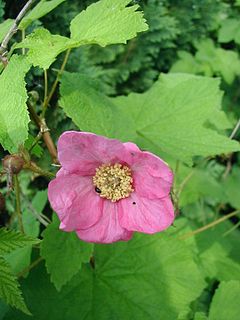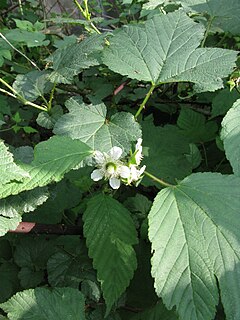
Rubus chamaemorus is a species of flowering plant in the rose family Rosaceae, native to cool temperate regions, alpine and arctic tundra and boreal forest. This herbaceous perennial produces amber-colored edible fruit similar to the blackberry. English common names include cloudberry, nordic berry, bakeapple, knotberry and knoutberry, aqpik or low-bush salmonberry, and averin or evron.

Rubus idaeus is a red-fruited species of Rubus native to Europe and northern Asia and commonly cultivated in other temperate regions.

Rubus spectabilis, the salmonberry, is a species of bramble in the rose family Rosaceae, native to the west coast of North America from west-central Alaska to California, inland as far as Idaho. Like many other species in the genus Rubus, the salmonberry plant bears edible fruit, typically yellow-orange or red in color, resembling raspberries in appearance.

Rubus phoenicolasius is an Asian species of raspberry in the rose family, native to China, Japan, and Korea.

Rubus caesius is a Eurasian species of dewberry, known as the European dewberry. Like other dewberries, it is a species of flowering plant in the rose family, related to the blackberry. It is widely distributed across much of Europe and Asia from Ireland and Portugal as far east as Xinjiang Province in western China. It has also become sparingly naturalized in scattered locations in Argentina, Canada, and the United States.

Rubus parviflorus, commonly called thimbleberry, is a species of Rubus native to northern temperate regions of North America. It bears edible red fruit similar in appearance to a raspberry, but shorter, almost hemispherical. Because the fruit does not hold together well, it has not been commercially developed for the retail berry market, but is cultivated for landscapes. The plant has large hairy leaves and no thorns.

Bush lawyer is a common name of a group of climbing blackberry plants that are found in New Zealand, many of them rampant forest vines. The Māori language name of the plant is tātarāmoa.

Rubus odoratus, the purple-flowered raspberry, flowering raspberry, or Virginia raspberry, is a species of Rubus, native to eastern North America, from Nova Scotia west to Ontario and Wisconsin, and south along the Appalachian Mountains as far as Georgia and Alabama.

Rubus leucodermis, also called whitebark raspberry or blackcap raspberry, is a species of Rubus native to western North America, from Alaska southward along the Pacific coast as far as California, Arizona, New Mexico, and Chihuahua.

Rubus strigosus, the American red raspberry or American raspberry, is a species of Rubus native to much of North America. It has often been treated as a variety or subspecies of the closely related Eurasian Rubus idaeus, but currently is more commonly treated as a distinct species. Many of the commercial raspberry cultivars grown for their fruit derive from hybrids between R. strigosus and R. idaeus; see Raspberry for more details.

Rubus niveus is a species of Rubus native to southern Asia, from Afghanistan east through India and China to Taiwan and the Philippines, south to Sri Lanka and Malaysia, and north to Gansu in China.

Rubus deliciosus is a North American species of flowering plant in the rose family Rosaceae, native to the United States. Common names include the delicious raspberry, boulder raspberry, Rocky Mountain raspberry or snowy bramble.

Rubus crataegifolius, also called Korean raspberry, is a species of raspberry native to East Asia.

Rubus ursinus is a North American species of blackberry or dewberry, known by the common names California blackberry, California dewberry, Douglas berry, Pacific blackberry, Pacific dewberry and trailing blackberry.

Rubus ulmifolius is a species of wild blackberry known by the English common name elmleaf blackberry or thornless blackberry and the Spanish common name zarzamora. It is native to Europe and North Africa, and has also become naturalized in parts of the United States, Australia, and southern South America.

Rubus flagellaris, the northern dewberry, also known as the common dewberry, is a North American species perennial subshrub species of dewberry, in the rose family. This dewberry is distributed across much of Canada, Mexico, and the United States. It grows in diverse habitats ranging from drier savannas to temperate deciduous forests.
Rubus lambertianus is a flowering plant species in the genus Rubus found in Southern China, Taiwan, Japan, and Thailand. Its ploidy is 2n = 4X (tetraploid). The ellagitannins lambertianin A, B, C and D can be found in R. lambertianus.

Crocus biflorus, the silvery crocus or scotch crocus, is a species of flowering plant in the genus Crocus of the family Iridaceae, native to southeastern Europe and southwestern Asia, including Italy, the Balkans, Ukraine, Turkey, Caucasus, Iraq, and Iran. It is a cormous perennial growing to 6 cm (2.4 in) tall and wide. It is a highly variable species, with flowers in shades of pale mauve or white, often with darker stripes on the outer tepals. The flowers appear early in spring.
Rubus frondosus is a North American species of flowering plant in the rose family. It has been found in Ontario and in the eastern and central United States from Maine south to Georgia and west as far as Oklahoma, Nebraska, and Minnesota. Common name is leafy-bracted blackberry.

Rubus pectinellus, commonly known as atibulnak, is a species of brambles in the rose family. It is native to Japan, southern China, Taiwan, and the Philippines. They usually grow in forests and valleys at elevations of 700 to 3,000 m. It is also known as kobanofuyuichigo (コバノフユイチゴ) in Japanese and huáng pào (黄泡) in Mandarin Chinese. Atibulnak fruits are edible, either raw or cooked, and have a pleasant subacid flavor. The leaves are also eaten as a vegetable in the Philippines.


















